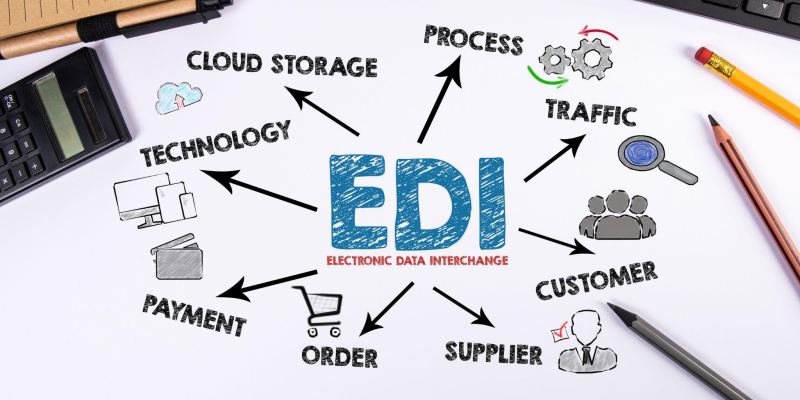
The roots of Electronic Data Interchange aka EDI, date back to the 1960s when companies began exploring different ways to automate business document exchange. Today, managed EDI services allow companies to outsource their EDI operations to skilled, knowledgeable third-party providers.
EDI has an important role in modern business operations. It increases efficiency and accuracy because of its automated nature contributing to cost savings. Additionally, EDI providers handle the complex parts of setup and configuration. As a result, companies alleviate the burden on their existing staff by allowing specialists to handle EDI complexities, and they can focus on key areas of their business.
Streamlining Business Processes
Managed EDI services simplify routine business processes by allowing companies to exchange data and important business documents directly. Bypassing the need for manual processes comes with several advantages. There are fewer errors when manual processes are eliminated.
Also, validation checks are a part of managed EDI services. When validation checks surface errors, your company can correct those errors before transmitting a finalized version of the data to your end recipients.
Consistent processing is at the core of managed EDI services. The consistency introduces a level of predictability in document exchange which helps to streamline your company’s operations.
Cost-Effectiveness of Managed EDI Services
Outsourcing EDI management can lead to significant cost savings for companies in the form of reduced costs associated with labor and infrastructure. The labor costs associated with managing EDI in-house are higher because it requires dedicated staff to serve as subject matter experts. Managed EDI services are significantly lower than employing a full-time team of specialized experts.
Outsourcing EDI services to a trusted partner eliminates the need for companies to make a significant upfront investment in the required hardware and software not to mention continued maintenance and future upgrades. Also, companies can scale their EDI system to onboard new trading partners and handle increased transaction volume at a fraction of the cost of what it would cost them to complete in-house.

Enhanced Data Security and Compliance
Providers of managed EDI services are very committed to ensuring data security. As a result, businesses who outsource their EDI needs are better able to comply with industry regulations. Robust encryption is a key component of outsourced solutions. In addition, providers use secure data centers that ensure advanced network security measures.
Providers of managed EDI services also stay up-to-date on ever-changing, complex regulatory climate and make sure their own systems adhere to new requirements accordingly. This helps businesses comply with industry regulations. .
Data protection is important in EDI transactions and EDI system management because data breaches or failure to comply in any other way can not only damage a company’s reputation but subject them to stiff financial penalties and legal consequences.
Scalability and Flexibility
Managed EDI services offer scalability to businesses, facilitating growth and expansion. Managed EDI services can adjust to increasing transaction volume whether it’s because of seasonal fluctuations or an increase in new customers. It is also much easier for businesses to onboard new trading partners when outsourcing EDI needs.
Managed EDI services can also easily accommodate any change a company has in their internal business processes including when they introduce new software systems or new operational workflows.
Access to Expertise and Support
There are numerous advantages of having access to EDI experts and continuous support. Any technical issues companies encounter can be dealt with very quickly by having access to experts, minimizing potential downtime.
This expertise can lead to better decision-making and problem-solving because outsourced providers continually manage the EDI system to ensure it is aligned with a company’s business needs and goals.
Improved Partner and Customer Relations
Efficient and reliable EDI operations lead to enhanced relationships with trading partners and customers by building trust and increasing satisfaction. Consistent and accurate data exchange is an important component in building that trust and satisfaction. Reliable EDI operations ensure the accuracy of data exchanged; efficient EDI processes help ensure the timely exchange of that data.
Focusing on Core Business Activities
When companies outsource EDI management including data system integration, they can refocus on their core business activities and strategies. They can more easily set themselves apart from their competitors by focusing on what they do best while being confident that their EDI management is being handled properly.
The additional focus that occurs when companies are freed from the responsibility of EDI management can drive innovation and growth. The timely access to data not only facilitates strategic decision making but also helps companies identify trends earlier. Companies can also redirect resources to cultivating strategic partnerships, something that is often overlooked when bogged down with managing EDI in-house.
Real-world Case Studies
Businesses across varied sectors have benefitted from managed EDI services. For example, Remedi helped a regional energy provider migrate to the cloud in one-fourth the time the client expected. Remedi also helped a global communications infrastructure solutions provider reduce the time it took them to onboard new trading partners by up to 75%. Another of Remedi’s clients, a wholesaler distributor and supply chain services company, was able to save over $200k on the remapping process of more than 100 of its trading partners.
Choosing the Right Managed EDI Service Provider
When selecting a managed EDI partner, businesses should look for a provider with experience in their specific industry. Companies should also ensure any potential provider can seamlessly integrate their EDI solutions with existing business systems. It’s also important for companies to look for providers that guarantee high availability and uptime. It’s important for companies to choose a provider that aligns with your company’s specific needs and goals. This ensures that the provider can effectively act as a strategic partner.
Conclusion
As discussed above, managed EDI services help businesses automate data exchange, leading to fewer errors and increased accuracy. Additionally, outsourcing EDI operations to a trusted provider results in significant cost savings and improves business efficiency. It also facilitates business growth and helps companies maintain a competitive advantage.
See some of our recent data integration success stories.



